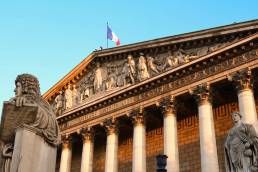In these times of war, with Russian troops in Ukraine, and growing approval of Euroscepticism, certain questions arise, such as „What are European values? How far would we go to defend them?“
When talking about „European values“ or a „European spirit“, it appears that these terms seem to be elusive and definitions could vary, whereas other concepts such as „the American Way of Life“ are much more tangible. In his book about values, the German author Peter Prange identifies in Europe a „culture of contrasts“ that becomes a „culture of productive tensions“. This means in Europe, concepts such as tolerance and parallel principles of: idealism and realism, freedom and responsibility, belief and rationality are always in a productive kind of tension; ultimately, they are thought of together because they can exist side by side.
This is how papacy and reformation, mysticism and enlightenment, or a scientific proof of God and atheism are ultimately in coexistence. This kind of multiperspectivity can be observed in Shakespeare’s plays, the author seeks to bring together different perspectives. In plays such as Julius Caesar, it cannot be figured out whether the playwright sympathizes with the Roman Emperor or his enemies.

Thus, Shakespeare’s reception through the ages is our constant point of reference as we journey through the evolution and development of the European spirit. The English playwright serves as a seismograph for the maturing development of the European spirit.
The Romantic Era as the foundation myth of the European Spirit
The Romantic Era became the climax of many philosophical, literary, and societal developments. By all means, it was the central era for the European idea, since European sentiments were all around at that time.
Yet, it was also this clash in the understanding of art that arguably reflected the opposing political attitudes as well. Under Napoleon and even before that time, France had a strict set of rules for French theatre and literature. The composition of a play was strictly regulated, clinging to the ancient rules of: the unity of time and place, the restriction of a play’s action to within a day’s timeframe and the strict separation of the classes. Political absolutism was reflected in restrictions in the artistic freedom.
Romanticism in England and Germany rather promoted ideas such as: imagination, individualism, intuition, inspiration and idealism. Poets found a role model in Shakespeare and his original genius. As a result, they propagated a free practice of art. Shakespeare was the main inspiration for poets of the Romantic Era. The genius appreciators of England’s national poet deduce ideals of freedom through time, realizing it both in literature and in politics. The more „democratic“ approach of artists in England and Germany, who were freer in their artistic work, also finds expression in a more democratic understanding of politics.
In the Romantic Era, Shakespeare became the most widely received author and playwright. His plays were performed all across Europe and quickly, translators tried to come up with the best Shakespeare translation in their native tongue. Thanks to their significance, Shakespeare’s plays serve as common European cultural property. Because artists in all countries adapted Shakespeare, nations developed their own literary identity and national literature – either in opposition to Shakespeare (France, Russia) or through absorption (Germany). It is well established that, due to his great influence, Shakespeare is a key factor in establishing the German national theatre.

Shakespeare becomes European cultural property – from national identity to a European idea
It must not be overlooked that France in the early 19th century not only aimed to conquer other nations politically, but also dominate their cultural life. In this way, there was also a cultural countermovement, with Shakespeare as the spearhead. This is why Shakespeare was disdained in France at the time; his works were considered barbarous.
France tried to ensure European unity under French leadership, but the opposite happened. Facing the French threat, the other European nations became more patriotic and developed a national spirit. It is fascinating that a greater devotion to one’s own national cultural and literary heritage leads to a greater link between European nations. The Romantic Era was the genesis of linguistic and young poets who began to study their nation’s language. In the end, they found that different European languages were related to each other and that they must have a common origin. In young intellectuals, the enthusiasm to explore their own nation’s origin led to an enthusiasm for finding cultural connections with other nations.
 The same enthusiastic discoveries apply to literary studies, finding links most prominently in the fairy tales. Before the Romantic Era, there was hardly an interest in the Nibelungen in Germany, but during the Romantic Era the interest in the stories of King Arthur and Beowulf were revived.
The same enthusiastic discoveries apply to literary studies, finding links most prominently in the fairy tales. Before the Romantic Era, there was hardly an interest in the Nibelungen in Germany, but during the Romantic Era the interest in the stories of King Arthur and Beowulf were revived.
Napoleon wanted to conquer the other nations politically and culturally, however he rather inspired them to explore their own heritage and find connections with other European neighbours.
Shakespeare as cultural ambassador in the Romantic Era and beyond
The playwright was a common reference point through history and an engine for cultural exchange across countries, influencing the emergence of national literature beyond the respective borders. Young poets in the Romantic Era studied Shakespeare and his ideas and connected with each other. In fact, the Romantic Shakespeare cult and the beginning of cosmopolitism were closely connected. In this way, the Romantic Era is commonly referred to as the foundation myth of the European spirit.
The Dark Romance, also called Gothic Fiction, was strongly shaped by Shakespeare, and marks the times of change and the transition into the modern era. This literary genre pronounced feelings and fears below the surface. It was a pivotal step in the development of individuality, for without paying attention to human fears or hidden desires, a complete view of the human being is not possible.
 In the Romantic Era, a great deal of societal development progressed that was almost synonymous with the advancement of European values. These developments include the dissolution of social hierarchies and the improved status of women in society. The Romantic Era was the first epoch with a notable number of recognized women publishing books. Other developments were progress in the fields of subjectivity and individualization. Beyond that, we observe the advancement of a number of social and moral issues.
In the Romantic Era, a great deal of societal development progressed that was almost synonymous with the advancement of European values. These developments include the dissolution of social hierarchies and the improved status of women in society. The Romantic Era was the first epoch with a notable number of recognized women publishing books. Other developments were progress in the fields of subjectivity and individualization. Beyond that, we observe the advancement of a number of social and moral issues.
The Dark Romanticism led to developments such as Sigmund Freud’s psychoanalysis. In fact, psychoanalysis was greatly influenced by Shakespeare. Sigmund Freud, an avid reader of Shakespeare’s works, used the poet’s characters to illustrate and explain psychological patterns. The development of psychoanalysis was a key step in European countries, since it took psychological disorders seriously and provided means to cure them.
Shakespeare – mirror and seismograph of the European spirit
In the 21st century, the history of the Shakespeare reception is still instructive when it comes to seeing how the European spirit has developed and to what extent attitudes have changed. It is even more exciting when we consider how Shakespeare is still interpreted and adapted for discussing political and social issues. Given the fact both the Brexit campaign and Remain advocates drew on Shakespeare in their arguments, it is evident that the playwright has not lost influence. He has shaped the European spirit over generations and, well, possibly he will continue to do so for the next century and generations to come – no matter if Britain is a member of the European Union or not. Shakespeare is a common European property and connects nations culturally.
In Sonnet 55 the poet uses a strong image:
Not marble nor the gilded monuments
Of princes shall outlive this powerful rhyme,
But you shall shine more bright in these contents
Than unswept stone, besmeared with sluttish time. (…)
So, till the judgment that yourself arise,
You live in this, and dwell in lovers‘ eyes.
Not only is Europa built on stone, but on the universal beauty of Shakespeare’s poetry.
Not only is Europe a political construct, led by pragmatism. Europe is also cultural diversity and cultural exchange.
Europe is beauty. Europe is aestheticism. Europe is decay, change and restart.
Europe is Shakespeare. And Shakespeare is an essential fundament of the European spirit.

Andreas T. Sturm is an MP of the State Parliament of Baden-Württemberg, Germany. At his parliamentary party, he is speaker for education and art policy. The former teacher has published books on Shakespeare. He can be found in the theatre as he acts on stage in his own Oscar Wilde play "Born to be Wild(e)" or breaking bread with shared perspectives at his "Dinner with Shakespeare".
This article is based on Sturm’s book: "Shakespeare und die Entstehung des europäischen Geistes" (engl. "Shakespeare and the Emergence of the European Spirit"), published in 2023.
Könnte Sie auch interessieren
9. Juli 2024
Konstantin von Notz : „Es ist Zeit, unsere Demokratien sehr entschlossen aufzustellen“
Er steht seit diesem Jahr an der Spitze des Geheimdienstausschusses des…
1. Juli 2024
European Parliamentary Elections: A Debacle for Pro-EU Parties or Their Last Chance?
Between 6 and 9 June, 400 million Europeans voted in the European Parliamentary…
24. Juni 2024
Dissolution of Parliament: Good or Bad for Democracy?
An hour after the results of the European elections, Emmanuel Macron announced…


